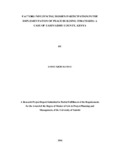| dc.description.abstract | Kenya has been prone to both internal and external threats to peace and security. Internally the country has been prone to intermittent ethnic clashes, particularly, among agro-pastoralist communities living in extreme deprivation in the marginal areas. In the past, Kenya has faced numerous threats to its national security and stability. These challenges have become increasingly sophisticated and complex with time. The resulting conflicts range from internal disputes between and within different groups, to cross border confrontations with groups from neighboring countries. The purpose of this study was to determine the factors influencing women participation in the implementation of peace building strategies in Uasin Gishu County in Kenya with a special focus to the United Nations Security Council 1325. A descriptive research was used to enable the researcher to meet the objectives of the study. This study targeted women groups, CBO‟s and NGOs working in Uasin Gishu County. Data was collected through questionnaires and interview schedule. The analysis involved the use of qualitative and quantitative data analysis techniques.The study revealed that lack of resources among women seriously undermines their peace efforts. Women‟s desire to participate in peace building is bedecked by slow entrenchment and lack of full implementation due to partly discriminatory practices in traditions, cultures and policies. Lack of education and access to information negatively affected women participation in sustainable peace building. Cultural practices such as women‟s role of bearing children; gender insensitive approaches to peace building, association of women with domestic spheres among others negated women involvement in sustainable peace building. The study concludes that women with high levels of education and those well positioned economically are more likely to participate in peace building strategies. Cultural practices such as women‟s role of bearing children, male chauvinism, domestic spheres among others impeded women involvement in sustainable peace building. The study recommends that social and economic development should be encouraged to secure the participation of women as equal partners with men in peace building. Literacy programs should also be offered for couples to encourage women‟s participation in building sphere. Women‟s organizations and civil societies should promote strong and sustainable peace networks at the rural and community level. Current women‟s networks predominantly operate in urban settings and greater efforts must be taken to access rural and community-based women organizations. Women organizations and civil society must develop the skills and technical expertise of women to operate in the peace and human security sectors and ensure that women‟s voices are not only heard but also incorporated into peace programs and policies that mandate gender mainstreaming within the peace and security structures in the society. | en_US |



